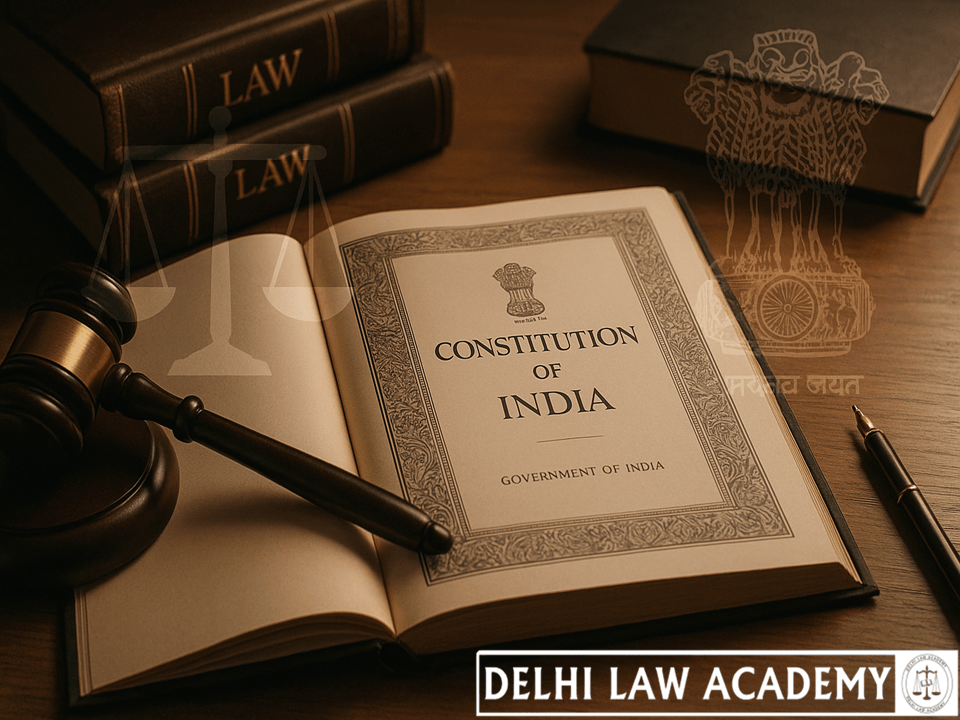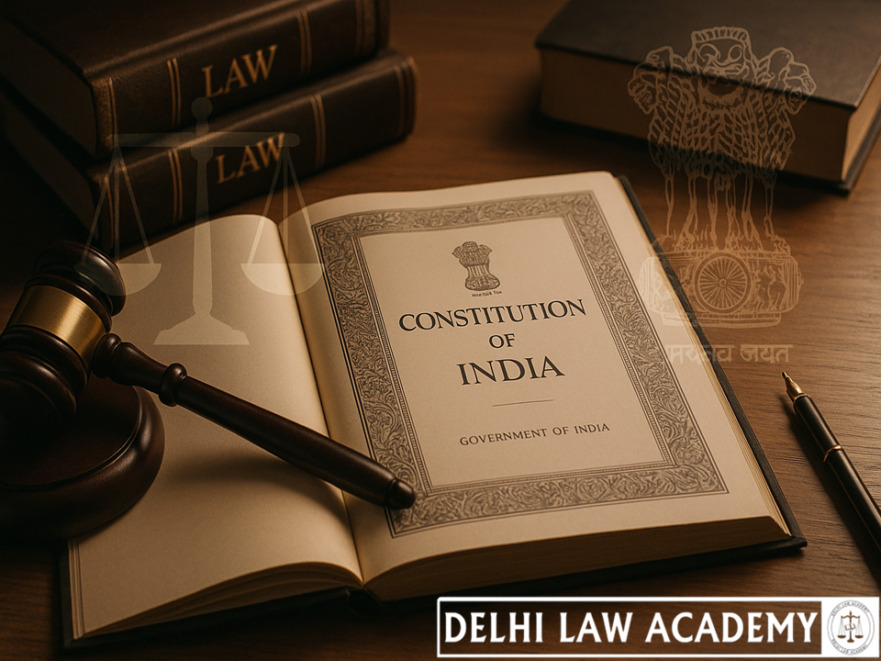
🏛️ State Legislature – Articles 182 to 192
Delhi Law Academy Jaipur | Simplified Notes for RJS, DJS & PCS(J) Aspirants
⚖️ Constitutional Provisions
Article 182 – Officers of Legislative Council
- Legislative Council shall choose:
- one member as Chairman
- another member as Dy. Chairman
- as and when these offices become vacant
Article 183 – Removal
- Removal of Chairman/Dy. Chairman:
- by a resolution of Council
- by a majority of all the then members
- 14 days notice to be given
- Resignation:
- Chairman to address it to Dy. Chairman
- Dy. Chairman to Chairman
- Chairman/Dy. Chairman to vacate office if he ceases to be a member of Council
Article 184
- When office of Chairman is vacant, his duties are performed by Deputy Chairman.
- If Deputy Chairman’s office is also vacant, Chairman’s duties are performed by a member of Council appointed by Governor.
- When Chairman is absent, Dy. Chairman acts as Chairman.
- If both absent, person determined by rules or Council shall act as Chairman.
Article 185
- When resolution for removal of Chairman is considered, he shall not preside, even if present.
- Similar rule applies for removal of Dy. Chairman.
- Chairman has right to speak and take part in proceedings but vote only in the first instance, not in case of equality.
Article 186 – Salaries of Officers
- Salaries and allowances of Chairman, Dy. Chairman, Speaker and Dy. Speaker to be fixed by State Legislature by law.
Article 187 – Secretariat
- Each House to have separate secretarial staff.
- Recruitment and service conditions to be regulated by State Legislature by law.
Article 188 – Oath by Members
- Every member of Assembly or either House to make oath before Governor or a person appointed by him before taking his seat.
Article 189 – Voting in Houses
- All questions in Assembly or either House to be decided by majority of votes of members present and voting, excluding Speaker or Chairman.
- Casting Vote: Speaker or Chairman shall not vote in first instance but shall exercise casting vote in case of equality.
- Validity: Proceedings remain valid even if a person not entitled to sit or vote has done so.
- Quorum: 10 members or 1/10th of total number of members, whichever is greater.
- Presiding Officer may adjourn or suspend meeting until quorum is met.
Article 190 – Vacation of Seats
- No person shall be member of both Houses; if chosen for both, must vacate one seat as per State law.
- No person shall be member of legislatures of two or more States; must resign from all but one within time fixed by President’s rules.
- A seat becomes vacant when a member is disqualified under Article 191 or resigns, provided resignation is voluntary and genuine.
- Seat may be declared vacant if member absent without permission for 60 days (excluding adjournment or prorogation).
Article 191 – Disqualifications for Membership
- A person shall be disqualified for being chosen as or for being a member if:
- he holds any office of profit under government
- is of unsound mind declared by a court
- is an undischarged insolvent
- is not a citizen of India
- is disqualified under any law made by Parliament
- Disqualification not to attach to offices declared by State Legislature or to office of Minister.
- Disqualification also applies if a person is disqualified under the Tenth Schedule.
Article 192 – Decision on Disqualifications
- Any question of disqualification under Article 191(1) shall be referred to the Governor.
- The Governor’s decision shall be final but must be based on the opinion of the Election Commission.
- The Governor is bound to act according to the Election Commission’s opinion.
📘 For more Constitution Notes, visit
www.delhilawacademy.com
📘 Stay Ahead with Delhi Law Academy!
Get access to free monthly current affairs, read our insightful blogs,
and explore free study resources prepared by experts at DLA Jaipur. 🚀
💡 Frequently Asked Questions on State Legislature (Articles 182–192)
🏛️ Who are the officers of the Legislative Council as per Article 182?
Under Article 182, the Legislative Council elects one of its members as the Chairman and another as the Deputy Chairman. These offices are filled whenever they become vacant.
⚖️ How can the Chairman or Deputy Chairman of the Legislative Council be removed?
As per Article 183, the Chairman or Deputy Chairman can be removed by a resolution of the Council passed by a majority of all its members. A 14-day notice is required before moving such a resolution.
📜 What happens when the office of the Chairman or Deputy Chairman becomes vacant?
Article 184 provides that when the Chairman’s office is vacant, the Deputy Chairman performs his duties. If both are vacant, a member appointed by the Governor or determined by the rules of procedure acts as Chairman.
💰 Who decides the salaries of the Speaker, Chairman, and their deputies?
Under Article 186, the State Legislature fixes by law the salaries and allowances of the Speaker, Deputy Speaker, Chairman, and Deputy Chairman of the State Legislature.
🗳️ What are the voting rules and quorum requirements under Article 189?
Article 189 states that all questions are decided by a majority of members present and voting. The Speaker or Chairman has only a casting vote in case of equality. The quorum is 10 members or one-tenth of total members, whichever is greater.
🚫 What disqualifies a person from membership under Article 191?
A person is disqualified if he holds an office of profit under the government, is of unsound mind, is an undischarged insolvent, is not a citizen of India, or is disqualified under a law made by Parliament or the Tenth Schedule.
Contact us
📍 Delhi Law Academy – Jaipur Branch
6C, Tower 2, Coaching Hub, Pratap Nagar, Jaipur – 302033
📞 Phone:
+91 9911916552
+91 8447285606
✉️ Email:
contactus@delhilawacademy.com

